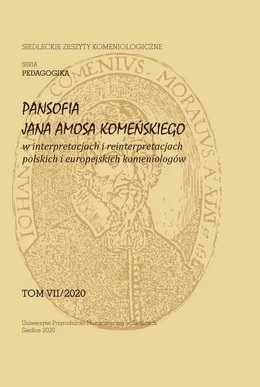Pansophism and pedagogy in the work of John Amos Comenius from the angle of pedagogy in Serbia
Słowa kluczowe:
John Amos Comenius, pansophism, didactics, principle of obviousness, pedagogyAbstrakt
The roots of today's education system stem from one of the most significant peda-gogists and thinkers, John Amos Comenius (1592-1670). His entire comprehensive and sys-tematic work represents a turning point, not only in the field of the development of pedagogy, as a science and its disciplines, but also in the field of the development of human thought in general. After a brief review of life and work of John Amos Comenius, the paper presents the basic concepts of pedagogical theory through the chapters they cover – his reforming and educational mission, contribution to the establishment and development of didactics and methodology of pedagogy, contribution to school, preschool and family pedagogy. Of particu-lar importance is the chapter that deals with pansophism as an ideological concept of univer-sal wisdom and pedagogy, because the central theme of the paper is focused on the relations-hip between pansophism and his overall pedagogical work. The aim of this paper is to theore-tically research the connection between these problems, as well as to understand their broa-der implications and current scientific achievements. The paper uses the method of theoreti-cal and historical analysis with the technique of content analysis of available and relevant historical and pedagogical sources and documents. The concluding remarks point to the im-portance of Comenius as a reformer important for the overall development of pedagogy as a science. His pansophism is permanently imprinted as a seal with a reflexive echo and reper-cussions on all later occurrences in the field of teaching and pedagogical educational activities. The ideas of John Amos Comenius that are practically tested and attested, carry a special strength and vitality even after three centuries, which makes him one of the true pedagogical classics.




